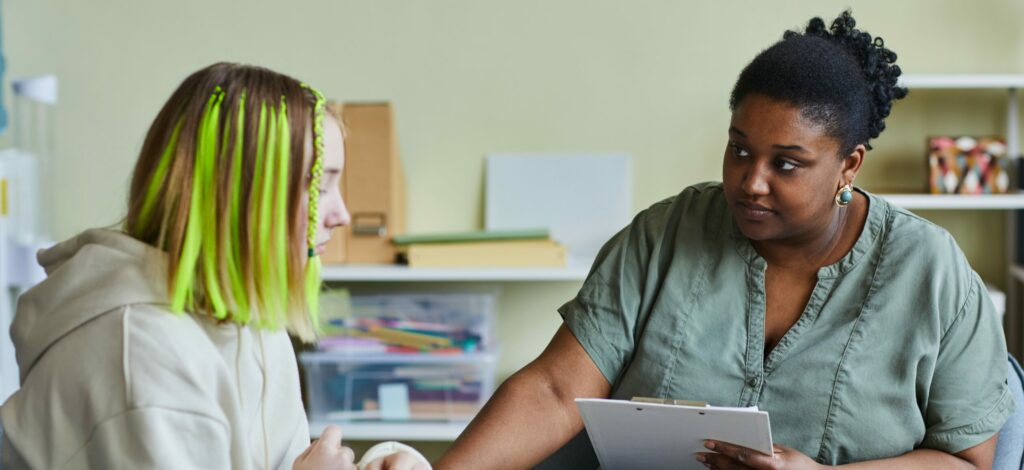Childhood trauma and repressed memories
Reviewed by Robert Bogenberger, PhD

In the United States, more than two-thirds of children experience a traumatic event by the time they turn 16.1 These experiences can include:


- Natural disasters
- Gun violence or other types of violence in the community
- Sexual, physical, emotional, or other kinds of abuse
- Exposure to domestic violence
- Neglect
- Any type of assault
- Accidents or serious illnesses for the child or a loved one
- The unexpected or violent loss of family or friends
Some therapists believe certain childhood traumas can be so threatening and overwhelming that people repress (forget) them to protect themselves. But because memory is a fluid process and our lives are often impossible to document with complete certainty, the theory that we can repress—and then can later recover—traumatic memories is controversial and hard to research accurately.
What are repressed memories?
Repressed memories (sometimes diagnosed as “dissociative amnesia”) involve trauma we can’t consciously recall—even though it remains stored in our brains, negatively affecting us.2 The idea is that some gaps in our memories can come from deeply distressing experiences, most often childhood ones, that were too extreme to process. The younger brain is considered more vulnerable and easily overwhelmed by trauma.
Many trauma and memory experts agree that it’s possible, though rare, to forget and then remember early traumatic memories. To complicate the picture, though, experts also agree that our brains can easily create believable memories of things that didn’t actually happen.3
Is it normal not to remember your childhood?
Forgetting details from your childhood is a very normal part of aging. Most of us forget many early memories in a common process called “childhood amnesia.” Between the ages of 8 and 10, we usually develop a stronger memory that helps us retain more events.
Is memory reliable?
Our memories aren’t ironclad records of past events. Rather, they’re a way for us to create meaning in our lives. The thoughts and feelings associated with our memories can help us understand our purpose and standing in the world.
When we form memories of events, our minds are influenced by many factors, including “concrete” memory (things we’ve experienced through our five senses), our beliefs about how the world works, and what other people have told us. There’s no entirely accurate way to separate these things out to determine what really happened, and studies have shown that we can easily be influenced to fill in gaps in our memory with inaccurate details or events.4
PTSD and memory problems
Experiencing or witnessing trauma can sometimes cause a person to develop posttraumatic stress disorder (PTSD), a mental health condition that can make the world feel very dangerous. People of any age can get PTSD, and approximately 6% of the US population will have it at some point in their lives.5
In addition to flashbacks, nightmares, trouble sleeping, and anxiety, PTSD symptoms can include memory problems. With PTSD, you may be unable to recall specific details of traumatic experiences, and you may also have trouble recalling things from your daily life.6
Signs of childhood trauma in adults
According to the International Society for Traumatic Stress Studies, adults who’ve survived childhood trauma often have higher rates of anxiety, depression, suicide attempts, self-harm, PTSD, relationship struggles, and drug and alcohol misuse. They also may have problems sleeping, regulating their emotions, and fighting off illness.7
If you’re having trauma symptoms you can’t otherwise explain, your therapist may want to explore the possibility of childhood trauma you don’t remember. In addition to the above, other indications that further exploration may help include:
- Anger or other negative feelings around certain vague memories
- Memories that don’t match the memories other people in your life share with you
- Phobias
- Certain smells, tastes, textures, places, or words that put you on edge
- Fear of abandonment or being alone
- Hypervigilance or panic attacks
- Hating yourself or having habitually negative thoughts about yourself
- Flashbacks
- Being uncomfortable with your body or with being touched
- Sexual dysfunction
- Not understanding your reaction to certain situations
Certain forms of therapy—such as hypnosis, age regression, or guided imagery—may help you identify or recall things you can’t remember. Working with a mental health professional can improve your chances of success and help lower your risk of developing false memories.
False memories
A false memory is one that you believe is true, but it’s either partially or fully made up.8 False memories can be vivid and convincing, and they can accidentally be created (or “implanted”) when you encounter compelling suggestions, narratives, or details that your brain then uses to construct a new memory without your consciously knowing it.
Trying to recover repressed memories can put you at risk of developing false memories. Some false memories, particularly ones involving childhood abuse, can be especially harmful. If you develop false childhood memories, it may be possible to remove them.9
Therapy for childhood trauma
Whether or not you have specific memories of childhood trauma, it’s important to seek care if you’re struggling. Therapists have many helpful techniques to treat trauma, including:
- Eye movement desensitization and reprocessing (EMDR)
- Cognitive processing therapy (CPT)
- Cognitive behavioral therapy (CBT)
- Prolonged exposure therapy
- Somatic therapy
- Group therapy
- Animal-assisted therapy
Browse our directory to find a licensed therapist in your area.
Get help now
If you’re in crisis, help is available 24/7. Call the free, confidential 988 Lifeline at 988 or 1-800-273-TALK (8255), or text HOME to 741741 to connect with a crisis counselor.

Sources
1 https://www.samhsa.gov/child-trauma/understanding-child-trauma/
2 https://www.merckmanuals.com/professional/psychiatric-disorders/dissociative-disorders/dissociative-amnesia/
3 https://www.apa.org/topics/trauma/memories/
4 https://www.tandfonline.com/doi/full/10.1080/09658211.2020.1870699/
5 https://www.ptsd.va.gov/understand/common/common_adults.asp/
6 https://cognitiveresearchjournal.springeropen.com/articles/10.1186/s41235-022-00386-6/
7 https://istss.org/public-resources/trauma-basics/what-is-childhood-trauma/effects-of-childhood-trauma/
8 https://www.science.org/doi/10.1126/science.1239073/
9 https://www.pnas.org/doi/10.1073/pnas.2026447118/
About the author
The editorial team at therapist.com works with the world’s leading clinical experts to bring you accessible, insightful information about mental health topics and trends.
Related articles

Mental health effects of sexual assault and abuse
Sexual assault affects people physically, mentally, and emotionally. Learn how...

When your religion rejects you, what comes next?
Healing from religious trauma can be especially hard for LGBTQIA+ people, who...

Healing from the trauma of gun violence
Gun violence survivors carry the pain of past experience and the risk of...

Caring for yourself when your job is caring for others
Mental health professionals help people in crisis and provide emotional support...
